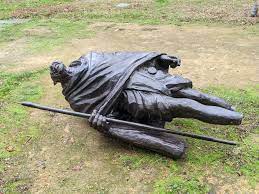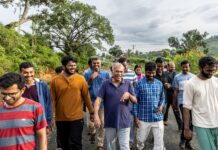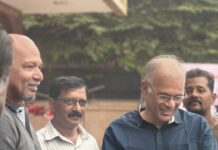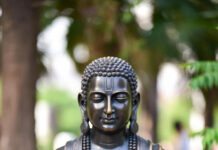
Dear Jeyamohan,
As you do, I too believe in Ahimsa and Gandhism. My heredity might have something to do with this. Grandfather of mine was a freedom fighter and was imprisoned for participating in toddy shop picketing and ‘Quit India Movement’. We have been upholding Indian nationalism all along. You are aware of the news published in the website of ‘Dinamani’ about the happenings in Sri Lanka. Readers’ criticisms were also published. When I wrote some of my ideas, I was scolded by many and was given ‘advice’. Indian nationalism was questioned and criticized. Many argued that Ahimsa can never succeed in freedom struggles and some of them contended that Gandhi was a bluff. Netaji was praised and Prabhakaran was claimed to be his follower. I do not have any disrespect towards Netaji. But I am sure that his doctrine did not succeed in the struggle for Indian Independence.
I have read some of your writings on Gandhism. Everyone knows that you believer in Gandhian ways. I think no one, except you, can clear my doubts. How did Gandhian way succeed in India’s freedom movement? Why those, who took to arms, could not make it? Could Netaji have achieved freedom, if he had enough arms and wealth? If so, is Gandhian way the principle of the weak? Was it not the struggle by millions in the Ahimsa way that brought us independence? Is power of arms greater than that of people’s psyche?
The hatred on India spewed by the e-magazines today is really frightening. With widespread use of the websites by today’s younger generation, it appears that this kind of wrong guidance could shake the fundamental idea of Indian nationalism. Is there a strong intellectual movement to spread the greatness of Indian nationalism?
I hope your ideas would clear my doubts.
With love,
Gurumoorthy Palanivel
Dear Palanivel,
The hatred poured on you is natural. Gandhian ideology is always against hatred. So, it is always encountered by hatred. Gandhi, in his lifetime, lived amidst the peak of hatred and abuse. He was always conversing with them.
The minds filled with hatred do not have any ideology, principle or even an objective of their own. It is natural for them to spew wrath. They find out some socio-political objective. They put forth that objective as something related to peak of morality and societal frustration. With that objective they justify their lust for power and hatred against humans. But, hatred remains the inner force.
There is only one base for this. They will trample on the very idealism, for which they spew hatred. They will massacre the very people, for whom they take up arms. For forty years it was denied that Mao did this in China. But, today they admit the folly. Maoists were doing the same thing in Andhra yesterday and are doing it today in the North Eastern villages.
The mental stimulation that is there in violent and armed struggles is absent in other types of social struggles. Only the intellectuals, who cannot face any violence in their personal lives, talk about this. It removes their boredom out of simple routines. It helps them to pretend to be serious with no compromise. For this pretence, which satiates their ego, they play with the lives of thousands and sacrifice them.
Violent feelings and ideas can be easily triggered and hence second-rate intellectuals and selfish politicians take to it instantaneously. Be it any society, you can very easily create divisions among people. Hitler explains this in his autobiography. On a dais, if one really becomes emotional, he can easily pass it on to the crowd around him. Those people would not care whether the emotion was genuine and whether there would be any positive result. It is only natural for a human being.
How do you acquire such ‘real’ negative emotion? It would be enough if the speaker slowly nurtures real hatred within him. That hatred would come out of him as a force. That is the power of Fascism. Modern politics has learned that hatred is a great political weapon. It knows how to make use of religion, clan, group identity and the like to spread hatred. The bloodshed that we see today the world over comes from that knowledge. Gandhism is the voice of human morality against this politics of hatred.
The four basic tenets of Gandhian way of struggle have made it the indispensable way of the century.
Firstly, a struggle should educate the people who are involved in it and it should sublimate them. There might be strong contradictions within a society. The struggle for a common cause should make mutual discussion possible. It should create an equilibrium among their contradictions.
Gandhian way of struggle ceaselessly mobilizes the people. Initially this makes the prevalent contradictions among the people to surface above. It would unceasingly compromise between those contradictions. Through that compromise it will make the people accept a common agenda and a common dream. It would be the struggle’s fundamental strength. It takes a long time for this to happen. That is why Gandhian movement puts forth a very composed, consistent, step-by-step struggle.
History of Indian freedom struggle for half a century shows how all inner contradictions of the Indian society were brought to a common space and slowly a compromise was arrived at. Gandhi had spent all his spiritual strength for this compromise. He had compromised again and again. He had brought the struggles, which were happening in the higher level until his entry, to the base level. He had brought all factions of the society into the struggle.
Many years back, senior communist leader C. Achutha Menon told me this. Through freedom struggle Gandhi had brought the Indian society into politics. He made the billions of common people of India to realize that they had the right to participate in politics. India’s leftist institutions were established on this base. India’s Dalit movement too was built on this base and Ambedkar was aware of this.
Thus, the freedom struggle led by Gandhi was only the next stage that the political awareness had naturally brought in. Most of the Indians were living in their own corners without any connection with political power. Gandhi gave them politics. After that, they could not live without power and could not be ruled by Zamindars and feudal lords and by the British over them.
It was a struggle where people faced the power that crushed them by developing themselves, a struggle to conquer slavery by weeding out their deficiencies. It was the basic aspect of Gandhi’s way of struggle.
Secondly, Gandhian struggle always keeps the ways open to weed out mistakes. There is always the chance of the stand taken for a struggle going wrong – human errors, philosophical errors and errors in understanding history. The losses of a struggle that can never backtrack will not be ordinary.
Social struggles belong to billions of people and their lives over centuries. Hundreds of finer aspects of their history and tradition are involved. It is impossible to workout a spotless method of struggle after understanding all those aspects. So, there would not be a path that is absolutely right.
Gandhi had backtracked in his struggles many a times. The moment he realized that his intention has been misunderstood or he had misunderstood the historic opportunity, he withdrew. He re-examined and started afresh in a different way. This is possible only in the Gandhian way of struggle.
Thirdly, the basic vision of Gandhian ways is that there is no absolute solution in history or social activities. To say, ‘I have found out the perfect way and I would not accept anything else’ does not mean understanding of society or history. It is only an absurd arrogance. Gandhi had a deep understanding of dialectics. Every force has an equal opposite force. Struggle is nothing but contradiction and compromise with that opposite force. Every struggle should always be ready for dialogue with the opposite side.
Gandhi’s freedom struggle was not meant to root out the British rule with the root soil. It is now surprising that his struggle was a long dialogue with the British power. He was always ready for dialogues with the British. He was putting forth his side before them. He retained whatever was achieved through dialogues and had further dialogues. He had never called the British his enemies. He did not picture them as demons and ghosts. He said that he was fighting for them too.
This attitude made him retain the British democracy, judiciary and journalism, though he could remove the British from power. Till date they continue to be the treasures of Indian civilization. He was a leader even for those against whom he fought.
Fourthly, Gandhian struggle is not single-edged. As mentioned earlier, it also aims at building up of a great society. When fighting against slavery, he found out hundreds of aspects that were the reasons for it and he removed them one by one. While fighting against the British, Gandhi visited the villages and propagated the use of toilets. He tried to restore the village economics and struggled for religious reformation.

In spite of some shortcomings, democracy in India is very strong, unlike any of its neighbours. Not even a casual comparison could be made with other nations. These democratic values took shape here only through the freedom struggle that was fought in Gandhian way.
Those who reject Gandhi’s methods should say how many armed struggles succeeded in the world history. Anyone with historical awareness would realise that during the last one hundred years, countries all over the world, that took to arms, gave nothing but destruction to their people.
If we look at the reasons for their destructive nature, we can see the absence of special qualities that are unique to the methods of Gandhi. What did the much talked about Russian and Chinese revolutions bring to their people? Did they bring anything other than destruction and slavery? History today has opened up this aspect clearly. Still, those who justified those revolutions till yesterday are, with no sense of shame, trying to find fault with Gandhi
From the Russian and Chinese Revolutions to the group clashes in Africa today, we see one thing in common. They first used arms for the internal contradictions, killed each other and vanished. Doubts, treachery and differences resulted in massacres. Every institution that took to arms has killed mostly its own people. Be it Russian, Chinese or any other armed war in the world, there is no single exception.
The reason is, violence never considers compromise between contradictions and the opportunity to move forward with collective effort. It makes dialogue impossible. The absence of any dialogue makes the armed society rigid. It becomes timid and loses faith. Thus, its internal contradictions increase and bring along destruction.
Today, we hear people casually referring to the experiments in Russia and China as sundry mistakes and setbacks in while bringing in communism. They do not consider the fact that billions of people vanished like worms and insects. Armed fight marches on burning the bridges behind. It believes just in destruction and the price of its mistakes is very high. It is always the poor and humble who pay that price, with their lives. Stalinists and Maoists may very well contend that wiping out the Klucks and the Cultural Revolution were mistakes. Do they have an answer for those who perished?
Armed struggle always marches ahead with a rigid conclusion that leaves no space for any dialogue. But no genius can, at any stage, take such a decision based on history and society. It would suffice if one looks at the history of the last fifty years. How many twists and turns that are unbelievable? How many marvelous possibilities? How many new forces? A struggle which considers that limit would always take into account its opposite force. It will always be a dialogue.
All opinions on Gandhian way have been put forward just because it allows dialogue. We do not have proper records about the struggle by Subash Chandra Bose. Subash did not take up an armed struggle. He was exploited by the then world forces. Within his Movement there were furious disputes between the North and the South. Above all, his so called armed struggle ended up as a farce. The Japanese used his army for its errands. Official documents reveal that it was in just one war front that INA got involved in direct action.
The most important point is that Subash tread on the blood of those men for whom he took to arms. He was witness to casualty of millions of poor Tamils and Indians on the Siam Death Railway Project. His conscience was silent about that human catastrophe. Would Gandhi have remained silent on hearing such an information?
If we look at the world politics of this century, we see the destruction resulting from meaningless struggles. Most of these were started by some intellectuals and nurtured by various power-centres. They manage to survive due to arrogance, lust for power, the resultant hatred and a chain reaction of violence.
At this moment, at least fifteen countries in Africa are being devastated by internal wars. Congo, Somalia, Ethiopia, Sierra Leon, Rwanda – we can list out the countries flooded with human blood. What triggered these internal wars? The simple answer would be the mistrust among the clans. How did that mistrust surface? By weapons! We seek justice from the very nations that produce and supply those arms to both groups!
We rumble what the world was doing when our race perished in the Eelam? We do not realize that one fourth of the world is being destructed by this kind of internal wars. We do not talk about what we did for those internal wars. A section of our intellectuals try to inculcate among our own people that attitude and the rage for arms, which caused those wars and destruction. And here they are praised for championing the cause of compassion.
Should Africa be razed by internal wars? Should all racist groups die in thousands fighting for the right to split into separate nations? Isn’t there any way to weed out those mistrusts? Can’t we find out those ways? What happened to the Irish freedom struggle and the Spanish internal war? When they can compromise and Europe can go to the extent of becoming a single nation, why should we create internal wars in Asia and Africa and ruin ourselves?
We have a great example before us, not only for Africa, but for the entire world. It was only Nelson Mandela, who had any ‘justification’ for taking up armed struggle. There was cruel apartheid and incomparable exploitation persisted. Many a times the situation demanded an armed struggle. The members of his party who preferred violence parted ways with him.
But, he had learnt from Gandhi. He taught his people a struggle by which they can improve themselves. For that, he imprisoned himself. I would say that the imprisonment of Mandela in Roban Island for twenty seven years is the greatest Gandhian struggle and Satyagraha of this century. It ensured participation of his people in a political movement and paved way for dialogue among them.
Moreover, it opened up dialogue with the conscience of his foes. We know that at one stage all the nations of the Whites took part in Mandela’s struggle with fervor. The freedom that South Africa attained was the result of that dialogue. It was not a freedom for the Africans alone, but for all the inhabitants including the Whites. It was an Independence attained without violence! It is history that we witnessed.
Looking at Mandela’s life, we see that he was for ever compromising. He was ceaselessly holding talks, with various factions of African National Congress, various sub-national institutions, the Zulus and the Whites. His biographers call him a great ‘expert of compromise’.
When there was bloodshed in Eelam and Congo was disintegrating, we watched the telecast of transfer of power in Africa resulting from peaceful elections. The lessons that we hesitate to learn were enacted there.
What would have happened, if Nelson Mandela had took to arms? Another Rwanda! Another Congo! Greatest bloodshed that humanity would have seen might have resulted. I recall watching on the television the historically important day on which Mandela took charge after the conduct of the first ever multi-racial election in Africa. Zulus had gathered on the streets with weapons, out of fear of becoming secondary citizens. We know who created that fear and why. I sat shocked all through the night after watching their violent shouts. I thought, going by the history of African countries, severe bloodshed was on the anvil.
But, Mandela overcame that crisis with his Gandhian weapon. He agreed to power sharing with the Zulu leaders with an open mind. By his sacrifice and peerless patience, he converted that historic situation into a golden one. That is how South Africa survives with democracy in the African continent, which is shrouded by dark wars.
This stands testimony to the everlasting victory of Gandhian ways and their relevance in the contemporary world. All armed wars can be cited as examples for the sure defeat of the ways of arms and the resultant destruction. Still, we are confronting the tirades of those filled with hatred. It is their hatred that seeks arms. We will converse with that hatred tirelessly. Let us ceaselessly hold talks with that hatred and always be prepared for a handshake.
Jeyamohan
From The Book in Tamil by Jeyamohan. Gandhi Today (InRaiya Gandhi)
Translated By Srinivasan











